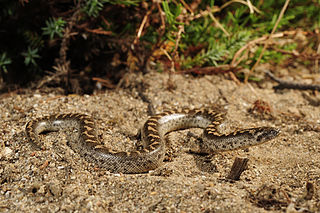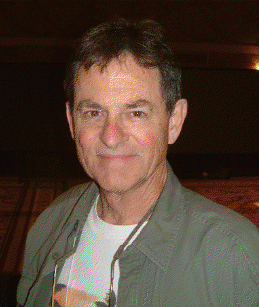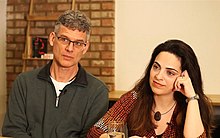Evolutionary psychology is a theoretical approach in psychology that examines cognition and behavior from a modern evolutionary perspective. It seeks to identify human psychological adaptations with regards to the ancestral problems they evolved to solve. In this framework, psychological traits and mechanisms are either functional products of natural and sexual selection or non-adaptive by-products of other adaptive traits.

In sexuality, seduction means enticing to sexual intercourse.

David Michael Buss is an American evolutionary psychologist at the University of Texas at Austin, researching human sex differences in mate selection. He is considered one of the founders of evolutionary psychology.

A psychological adaptation is a functional, cognitive or behavioral trait that benefits an organism in its environment. Psychological adaptations fall under the scope of evolved psychological mechanisms (EPMs), however, EPMs refer to a less restricted set. Psychological adaptations include only the functional traits that increase the fitness of an organism, while EPMs refer to any psychological mechanism that developed through the processes of evolution. These additional EPMs are the by-product traits of a species’ evolutionary development, as well as the vestigial traits that no longer benefit the species’ fitness. It can be difficult to tell whether a trait is vestigial or not, so some literature is more lenient and refers to vestigial traits as adaptations, even though they may no longer have adaptive functionality. For example, xenophobic attitudes and behaviors, some have claimed, appear to have certain EPM influences relating to disease aversion, however, in many environments these behaviors will have a detrimental effect on a person's fitness. The principles of psychological adaptation rely on Darwin's theory of evolution and are important to the fields of evolutionary psychology, biology, and cognitive science.
Human behavioral ecology (HBE) or human evolutionary ecology applies the principles of evolutionary theory and optimization to the study of human behavioral and cultural diversity. HBE examines the adaptive design of traits, behaviors, and life histories of humans in an ecological context. One aim of modern human behavioral ecology is to determine how ecological and social factors influence and shape behavioral flexibility within and between human populations. Among other things, HBE attempts to explain variation in human behavior as adaptive solutions to the competing life-history demands of growth, development, reproduction, parental care, and mate acquisition. HBE overlaps with evolutionary psychology, human or cultural ecology, and decision theory. It is most prominent in disciplines such as anthropology and psychology where human evolution is considered relevant for a holistic understanding of human behavior.

Mate choice is one of the primary mechanisms under which evolution can occur. It is characterized by a "selective response by animals to particular stimuli" which can be observed as behavior. In other words, before an animal engages with a potential mate, they first evaluate various aspects of that mate which are indicative of quality—such as the resources or phenotypes they have—and evaluate whether or not those particular trait(s) are somehow beneficial to them. The evaluation will then incur a response of some sort.
Evolutionary psychology seeks to identify and understand human psychological traits that have evolved in much the same way as biological traits, through adaptation to environmental cues. Furthermore, it tends toward viewing the vast majority of psychological traits, certainly the most important ones, as the result of past adaptions, which has generated significant controversy and criticism from competing fields. These criticisms include disputes about the testability of evolutionary hypotheses, cognitive assumptions such as massive modularity, vagueness stemming from assumptions about the environment that leads to evolutionary adaptation, the importance of non-genetic and non-adaptive explanations, as well as political and ethical issues in the field itself.
Robert Kurzban is an American freelance writer and former psychology professor specializing in evolutionary psychology.

The Red Queen: Sex and the Evolution of Human Nature is a popular science book by Matt Ridley exploring the evolutionary psychology of sexual selection. The Red Queen was one of seven books shortlisted for the 1994 Rhône-Poulenc Prize, that was eventually won by Steve Jones' The Language of the Genes. The title is in reference to the Red Queen hypothesis in evolutionary biology.

Sexual selection in humans concerns the concept of sexual selection, introduced by Charles Darwin as an element of his theory of natural selection, as it affects humans. Sexual selection is a biological way one sex chooses a mate for the best reproductive success. Most compete with others of the same sex for the best mate to contribute their genome for future generations. This has shaped human evolution for many years, but reasons why humans choose their mates are not fully understood. Sexual selection is quite different in non-human animals than humans as they feel more of the evolutionary pressures to reproduce and can easily reject a mate. The role of sexual selection in human evolution has not been firmly established although neoteny has been cited as being caused by human sexual selection. It has been suggested that sexual selection played a part in the evolution of the anatomically modern human brain, i.e. the structures responsible for social intelligence underwent positive selection as a sexual ornamentation to be used in courtship rather than for survival itself, and that it has developed in ways outlined by Ronald Fisher in the Fisherian runaway model. Fisher also stated that the development of sexual selection was "more favourable" in humans.
Douglas T. Kenrick is professor of psychology at Arizona State University. His research and writing integrate three scientific syntheses of the last few decades: evolutionary psychology, cognitive science, and dynamical systems theory. He is author of over 170 scientific articles, books, and book chapters, the majority applying evolutionary ideas to human cognition and behavior.

Randy Thornhill is an American entomologist and evolutionary biologist. He is a professor of biology at the University of New Mexico, and was president of the Human Behavior and Evolution Society from 2011 to 2013. He is known for his evolutionary explanation of rape as well as his work on insect mating systems and the parasite-stress theory.

The Evolution of Human Sexuality is a 1979 book about human sexuality by the anthropologist Donald Symons, in which the author discusses topics such as human sexual anatomy, ovulation, orgasm, homosexuality, sexual promiscuity, and rape, attempting to show how evolutionary concepts can be applied to humans. Symons argues that the female orgasm is not an adaptive trait and that women have the capacity for it only because orgasm is adaptive for men, and that differences between the sexual behavior of male and female homosexuals help to show underlying differences between male and female sexuality. In his view, homosexual men tend to be sexually promiscuous because of the tendency of men in general to desire sex with a large number of partners, a tendency that in heterosexual men is usually restrained by women's typical lack of interest in promiscuous sex. Symons also argues that rape can be explained in evolutionary terms and feminist claims that it is not sexually motivated are incorrect.

In evolutionary psychology and behavioral ecology, human mating strategies are a set of behaviors used by individuals to select, attract, and retain mates. Mating strategies overlap with reproductive strategies, which encompass a broader set of behaviors involving the timing of reproduction and the trade-off between quantity and quality of offspring.

The following outline is provided as an overview of and topical guide to evolution:
Mate value is derived from Charles Darwin's theory of evolution and sexual selection, as well as the social exchange theory of relationships. Mate value is defined as the sum of traits that are perceived as desirable, representing genetic quality and/or fitness, an indication of a potential mate's reproductive success. Based on mate desirability and mate preference, mate value underpins mate selection and the formation of romantic relationships.

Social selection is a term used with varying meanings in biology.
The ovulatory shift hypothesis holds that women experience evolutionarily adaptive changes in subconscious thoughts and behaviors related to mating during different parts of the ovulatory cycle. It suggests that what women want, in terms of men, changes throughout the menstrual cycle. Two meta-analyses published in 2014 reached opposing conclusions on whether the existing evidence was robust enough to support the prediction that women's mate preferences change across the cycle. A newer 2018 review does not show women changing the type of men they desire at different times in their fertility cycle.

Diana Santos Fleischman is an American evolutionary psychologist. Her field of research includes the study of disgust, human sexuality, and hormones and behaviour. She is also involved in the effective altruism, animal welfare, and feminism movements.
Spent: Sex, Evolution, and Consumer Behavior is a 2009 book by Geoffrey Miller.













